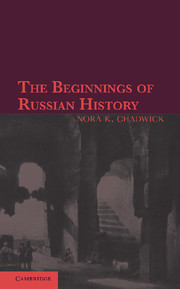Book contents
- Frontmatter
- Dedication
- Epigraph
- Contents
- Preface
- Chapter I The Early Records
- Chapter II The Early History of Kiev
- Chapter III Greek and Oriental Evidence
- Chapter IV Vladimir I
- Chapter V The Treaties with the Greeks, and Russian Heathenism
- Chapter VI Yaroslav the Wise
- Chapter VII Voevoda and Kormilets
- Chapter VIII Vladimir Monomakh
- Appendix I Extract from Ibn Miskawaih, in The Eclipse of the 'Abbasid Caliphate, Vol. v. Translated from the Arabic by D. S. Margoliouth
- Appendix II The Scandinavian Background: Oddr Víth-förli (Örvar-Oddr)
- Index
Appendix II - The Scandinavian Background: Oddr Víth-förli (Örvar-Oddr)
Published online by Cambridge University Press: 05 June 2016
- Frontmatter
- Dedication
- Epigraph
- Contents
- Preface
- Chapter I The Early Records
- Chapter II The Early History of Kiev
- Chapter III Greek and Oriental Evidence
- Chapter IV Vladimir I
- Chapter V The Treaties with the Greeks, and Russian Heathenism
- Chapter VI Yaroslav the Wise
- Chapter VII Voevoda and Kormilets
- Chapter VIII Vladimir Monomakh
- Appendix I Extract from Ibn Miskawaih, in The Eclipse of the 'Abbasid Caliphate, Vol. v. Translated from the Arabic by D. S. Margoliouth
- Appendix II The Scandinavian Background: Oddr Víth-förli (Örvar-Oddr)
- Index
Summary
It has long been recognised that the story of Oleg, and more especially that of his death, bears a close resemblance to the story of Örvar-Oddr, the great Halogaland hero of early Norse saga, who is known to Norse tradition as ‘Oddr the Far-travelling’, and who gained fame, not only among his own people, but also abroad as a result of a famous journey to Bjarmaland which he is said to have made in early life. He is also known as Örvar-Oddr because he possessed three famous arrows, known as the Gusisnautar, ‘Gusi's treasure’, which had been taken by his grandfather, Ketill Haengr, from Gusi, the king of the ‘Finns’. The story of Örvar-Oddr's death is so closely similar to that of Oleg (O.N. Helgi) that there can be no possible doubt that the same story has been told of both heroes. Opinion has differed as to which is the original, but a possible solution has been found by Stender-Petersen, who points out that the story is probably of Turkish origin, and that it has spread, not only to Russia and the north, but also to the Balkans, where it is found in a form closely resembling that of the Russian Oleg. It is not improbable that the story has been brought from Byzantium by Varangians, and transmitted from Varangians in Kiev to Scandinavia.
The question naturally arises why the story should have become attached to Örvar-Oddr, and this, not as a single episode incorporated mechanically into his saga, but interwoven carefully into the weft of the story. The explanation would seem to lie in some feature in the original story of Oddr which has resembled the ‘death story’, and for which the latter has been substituted, perhaps after it had become widely known. Possibly some such explanation may underlie the introduction of the story into the account of the death of Oleg also. But there must be some close connection between the Russian and the Norse stories, independent of their common origin, because the incident of the snake is also common to both, whereas this feature seems to have been absent from the original version. It has therefore been added, in all probability in Russia.
- Type
- Chapter
- Information
- The Beginnings of Russian HistoryAn Enquiry into Sources, pp. 145 - 174Publisher: Cambridge University PressPrint publication year: 2013



